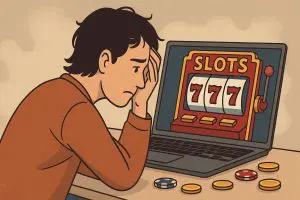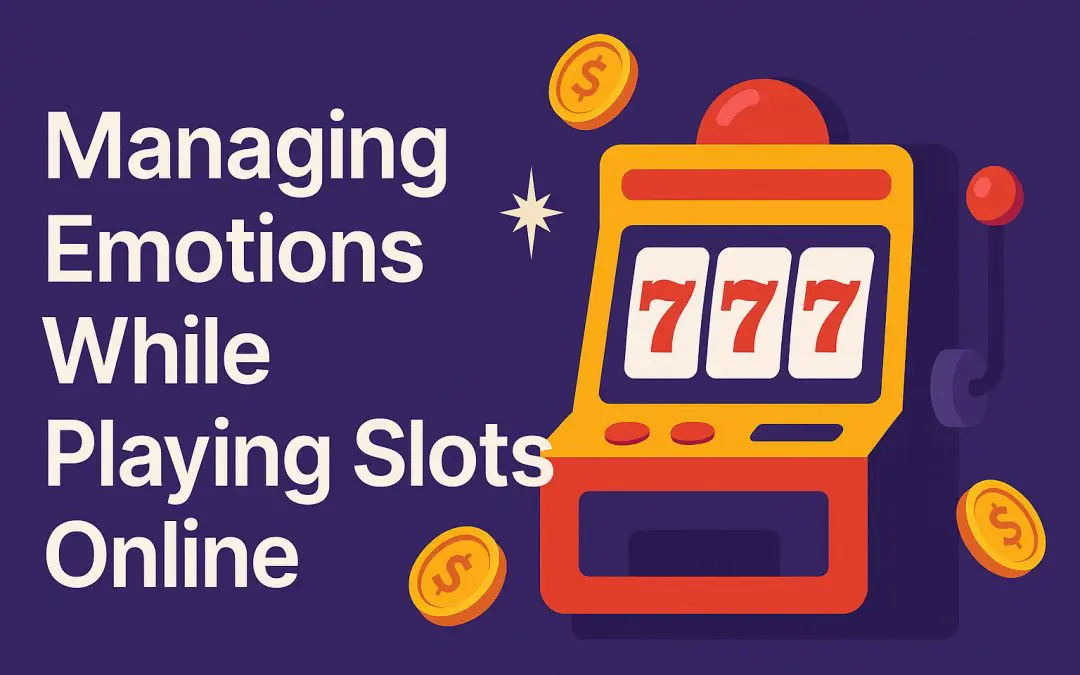There’s something oddly hypnotic about watching reels spin. The flashing lights, the tiny build-up before they stop — it’s a mini heart-race every single time. For a second, you forget about the world outside your screen. Then, either the win sound hits and you feel like a genius, or it doesn’t, and your brain goes, “Okay, maybe just one more spin.”
That little voice is where most players get into trouble. The game isn’t the real challenge — it’s your own emotions sitting in the passenger seat, whispering you toward “just one more.” Managing emotions while playing slots online isn’t about being made of steel; it’s about learning to notice when your excitement turns into impulse.
Why Managing Emotions Matters in Online Slots
Slots are sneaky. They’re built to make your brain feel like it’s in control, even though randomness is doing all the driving. The lights, the “almosts,” the sound when you get two matching symbols but not the third — all of it’s designed to give you small bursts of dopamine that say, you’re so close, keep going.
I remember a friend, Sam, who’d always laugh when a near-miss popped up on screen. He’d lean back, grin, and go, “They got me again!” It was funny the first few times. Then I realized he was always saying it — always right before betting a little more. It wasn’t bad luck. It was psychology doing its thing.
When you start recognizing those patterns — the emotional hooks — the game becomes way more manageable. You stop playing reactively and start playing intentionally. And weirdly enough, that’s when it gets fun again.
The Little Spiral That Sneaks Up
Here’s a scene almost every slot player has lived through:
You hit a nice win, maybe triple your bet, and for a moment you feel untouchable. Then things cool off. You spin again, nothing. You up the stakes. “The next one’s gotta hit.” Before you know it, you’ve burned through half your winnings and feel that tiny sting of regret.
That’s emotion, plain and simple — your brain chasing a chemical rush. Not greed, not stupidity. Just a natural response that needs managing like caffeine or adrenaline.
Common Emotional Triggers in Online Slots
The emotional triggers in slot play are a mix of magic and manipulation. Some are easy to spot, others sneak right past you.
The near-miss effect is the big one. It’s wild how your brain reacts almost the same to “almost winning” as it does to winning. You get the dopamine hit without the payout. That’s like your brain giving you dessert just for looking at the menu.
Then there’s loss chasing. The emotional math goes something like: “If I lost $50, I’ll win it back with $60.” But it doesn’t quite work that way, does it? It’s not even about the money at that point — it’s about proving something to yourself.
And my personal favorite — the confidence spike after a win. You start thinking you’ve “figured out the rhythm.” There is no rhythm, of course, but it feels like there is, and that’s enough to make you double down.
Online slots intensify it all. You don’t have the real-world anchors — no coins clinking down, no physical stack dwindling, no closing hours. Just you, your balance, and a glowing “Spin” button that’s always ready.
How Emotions Sneak Into Gambling Decisions
Emotions warp logic in sneaky ways. When you’re feeling good, you take risks. When you’re annoyed, you take different risks. Both feel justified in the moment.
There’s a thing gamblers call “tilt.” It’s borrowed from poker, but it fits slots too — when your emotions override your thinking. Suddenly, you’re not even trying to win logically. You’re trying to feel better.
I once had a night where I was playing casually and lost a few small spins. No big deal. Then, after one particularly close miss, I felt this sudden rush of irritation — like the game owed me. I caught myself slamming the spin button faster and faster. I had to stop and literally laugh at myself. That moment right there? Classic emotional tilt.
Strategies for Emotional Self-Control in Online Slots
You don’t have to meditate in lotus position to have control. You just need a few tricks that keep you grounded — enough to separate “fun” from “frantic.”
Setting Limits: Financial and Emotional Boundaries
Before you open a single slot, know two things: how much you’re willing to spend and how long you’ll play. Think of it like buying concert tickets — once you pay for the night, that’s the cost of entertainment.
And emotional limits are just as crucial. Ask yourself, am I playing because I’m bored, stressed, or excited? If you’re in a weird headspace, the game will amplify it. Trust me, playing to “take your mind off something” almost always ends with more to think about.
One trick I like is writing a small reminder before playing — literally scribbling “Stop if you start chasing” on a sticky note. You’d be surprised how grounding it feels when you catch your reflection mid-spin and see your own handwriting telling you to chill.
Grounding and Pause Techniques That Actually Work
When things start to feel heated, the best move isn’t “power through” — it’s pause. You don’t even have to call it mindfulness. Just tiny resets. A few that actually work:
- Stand up. Move. Shake off the tension. Changing your posture resets your focus faster than you think.
- Touch something real. Your chair, the table, your coffee mug. Anything tactile brings your brain back to reality.
- Take a micro-break. Literally close your eyes for five seconds. Let your shoulders drop. Then look at the screen fresh.
- Say the odds out loud. “Each spin is random.” Hearing it helps more than thinking it.
- Do a quick redirect. Text a friend, grab a snack, play a song. Something outside the loop.
The goal isn’t to stop emotions — it’s to slow them down long enough for logic to catch up.
Recognizing and Setting Emotional Stop-Lines
 Financial stop-lines are easy — you set a number, you stop when you hit it. Emotional ones are trickier but more powerful.
Financial stop-lines are easy — you set a number, you stop when you hit it. Emotional ones are trickier but more powerful.
My personal stop-line is: “If I start leaning forward.” Sounds silly, but every time I catch myself physically tensing toward the screen, it’s a signal. It means I’m too invested. Time for a reset.
Try finding your own. Maybe it’s when you start clicking faster, or when you realize you’re muttering to yourself about the reels. Those are your body’s “warning lights.” Listen to them before the fun turns into noise.
Mindset Habits of Responsible Slot Players
The players who enjoy slots the longest don’t have secret strategies — they just have boundaries that feel second nature. A few common habits you’ll see among them:
- They treat slots as stories, not investments.
- They don’t measure fun in winnings.
- They quit mid-streak if they’re starting to feel wired.
- They replay their best sessions in memory, not their worst.
- They reflect, even casually — “Was that fun or stressful?”
It’s like any hobby that flirts with obsession — balance keeps it enjoyable.
Handling Wins and Losses with Emotional Balance
Winning feels electric. You get the lights, the sound, the mini dopamine fireworks. But here’s the trap: you start wanting that exact feeling again. You’ll keep spinning, not to win money, but to feel that high.
After a big win, I have a rule: step away for at least an hour. Go do dishes, walk the dog, whatever. If you can come back later and the excitement’s cooled, then you can play again responsibly.
Losses are the opposite — quiet, heavy, sneaky. Sometimes you’ll chase without realizing it. The brain goes, “I’ll just get back to even.” But that’s like saying, “I’ll eat another slice of cake to undo the first one.” It doesn’t work that way.
Reframing helps: think of each session as paying for entertainment, like a movie ticket. You don’t expect a refund when the credits roll.
A Tiny Real-Life Moment
A friend of mine, Ellie, once said, “I started treating every slot session like ordering a fancy coffee. Sometimes it’s overpriced, but it makes me happy — as long as I don’t order ten in a row.” That’s probably the healthiest take I’ve ever heard about slots.
When to Seek Support for Gambling Emotions
Sometimes, despite all the tricks and limits, the game starts feeling heavier than fun. You might catch yourself playing longer than planned or getting that pit-in-the-stomach feeling afterward. If that happens, it’s time to talk — not necessarily to a therapist right away, maybe just a friend who gets it.
If you start hiding your sessions, lying about losses, or feeling anxious when you can’t play — those are signs worth listening to. Most countries have free chatlines or online communities for gambling support. They’re not lectures; they’re people who’ve been there.
Online casinos themselves often offer self-exclusion tools or cool-off timers. They’re not buzzkills — they’re safety nets. Use them like seatbelts, not shackles.
Final Tips for Healthy Gambling and Emotional Management
At the end of the day, the goal isn’t to kill the excitement — it’s to keep it from turning toxic. Here’s a short checklist I’ve learned to stick to, even on the good days:
- Check your mood before you play.
- Decide your limit and stick to it, no matter how good it’s going.
- Pause if your heart rate’s higher than usual.
- Celebrate wins by stepping away, not spinning more.
- End while you’re still smiling.
Slots should feel like a roller coaster — thrilling, a bit wild, but never out of control. The best part? You can always ride again later, with both feet still on the ground.


